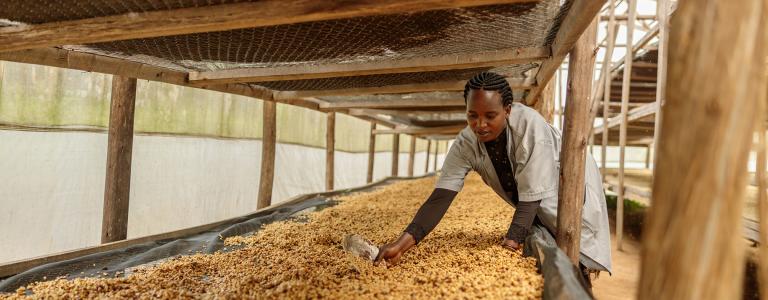Three Ways Standards Can Help Deliver on the Sustainable Development Goals
How can sustainability standards help deliver results on Sustainable Development Goals 2, 6, and 17 and support governments to track their progress ahead of the 2023 High-Level Political Forum for Sustainable Development?
Preparations for the 2023 High-Level Political Forum on Sustainable Development (HLPF) next month are in full swing. This annual event marks a key moment in the sustainable development calendar—a moment for countries to pause, take stock of their progress, and discuss how to make the 2030 Agenda for Sustainable Development a reality.
The July 2023 session of the HLPF will serve as an opportunity to prepare for a comprehensive review of progress on all 17 Sustainable Development Goals (SDGs) at the SDG Summit in September. This HLPF will focus on five SDGs, including SDG 6 on clean water and sanitation and SDG 17 on partnerships for the goals.
At the International Institute for Sustainable Development (IISD), we have developed a set of recommendations on how countries could leverage the power of partnerships and work with voluntary sustainability standards (VSSs) to report on SDG progress.
VSSs set requirements for producing, selling, and purchasing products responsibly. Recent research has shown that VSS and SDG targets often overlap, particularly for SDGs 2, 6, and 17—all of which will be in the HLPF’s spotlight this year or next. Here are some examples of how standards can help deliver results on these three SDGs and help governments track their progress ahead of the HLPF.
Supporting SDG 2: Zero hunger
The Fairtrade International standard has been working in Uganda to improve agricultural productivity and smallholder incomes (SDG target 2.3) by delivering business and leadership skills training and support to the Gumutindo Coffee Cooperative.
The training of more than 1,200 women has informed farmers about the importance of diversifying sources of income beyond coffee—the main source of earning in the community—into other crops or enterprises. Women farmers now earn extra income by selling vegetables, kerosene, and other products.
Another positive outcome of the training has been informing women about the land tenure system, including how they could obtain the legal title for their land. As a result, more women are becoming aware that they can own land alongside their husbands, more joint legal titles are being issued, and more women are receiving land holdings in their own names.
This example illustrates how VSS-supported educational efforts can promote access to land titles and deliver income improvements under SDG 2 while also supporting gender equality (SDG 5).
Supporting SDG 6: Clean water and sanitation
The Alliance for Water Stewardship (AWS) Standard is collaborating with producers in Tanzania to increase water-use efficiency and address water scarcity (SDG target 6.4).
A coffee plantation owned by Olam International Ltd. in southern Tanzania’s upper Ruvuma basin became certified in 2015 under the AWS Standard, in collaboration with Water Witness International, which was responsible for tracking and monitoring the costs and benefits of implementing the standard.
By complying with the AWS Standard, the coffee plantation—which irrigates more than 2,000 hectares and employs some 2,350 people, including more than 1,000 outgrowers—improved its water-use efficiency. It started a water-use monitoring system onsite, set efficiency targets, and ensured its water use corresponded with its permit of allowable water volume so as not to jeopardize environmental flows.
In addition, a review of Olam’s water permit led to negotiations for the plantation to use less water than allowed under its 2015 permit. This reduction in water use could help prevent conflicts with other users and build local water security for nearly 300,000 people.
This case illustrates how the AWS Standard, in partnership with Olam and Water Witness International, contributes to advancing SDG target 6.4 by enabling water monitoring, use, and consumption; planning water extraction and irrigation; and preventing water scarcity in neighbouring communities.
Supporting SDG 17: Partnerships for the goals
VSSs can also deliver sustainability benefits beyond certification. They play an important role in facilitating dialogue and fostering public-private partnerships between governments, VSS bodies, and multiple stakeholders—including farmers, buyers, producers, investors, and local authorities. This communication can help build trust, support policy coherence, and lead to improved coordination, strategies, and partnerships to tackle key sustainability issues.
Countries could leverage those partnerships to report on SDG progress when preparing their Voluntary National Reviews (VNRs) for the HLPF. By capturing the results of the work VSSs are doing in their jurisdictions, as the case studies from Uganda and Tanzania demonstrate, governments could strengthen their VNR reporting by filling data gaps and providing evidence of SDG implementation on the ground.
Detailed recommendations can be found in IISD’s new report, titled Standards and the Sustainable Development Goals: Leveraging sustainability standards for reporting on SDG progress. Launched ahead of HLPF 2023, the publication formulates guidelines to help interested governments lean into multi-stakeholder partnerships to bolster their VNR preparation and reporting efforts.
You might also be interested in
State of Sustainability Initiatives Review: Standards and the Sustainable Development Goals
This report explores the role that voluntary sustainability standards (VSSs) can play in helping governments advance the Sustainable Development Goals (SDGs) and better track and report on their progress toward achieving them.
Promoting the Development of Agricultural Cooperatives
Governments in the Global South should promote agricultural cooperatives to boost smallholder access to fair markets, finance, and climate resilience.
What Will Happen at COP 29?
Talks at the 2024 UN Climate Change Conference (COP 29) will range from defining a way forward on finance through a new collective quantified goal (NCQG) to mitigation, and loss and damage. Ahead of negotiations in Baku, IISD’s Earth Negotiations Bulletin Team Lead Jennifer Bansard examines the agenda and breaks down what to watch as eyes turn to Azerbaijan.
Securing India's Copper Supply
This policy brief emphasizes the need for India to develop a comprehensive copper strategy.
